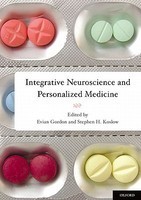Working with Healthcare Stakeholders towards Brain-Based Personalized Medicine
(Editor’s Note: this is Part 3 of the new 3‑part series written by Dr. Evian Gordon drawing from his participation at the Personalized Medicine World Congress on January, 23, 2012 at Stanford University.)
Working with Health Care Industry Stakeholders: Clinicians, Pharma/Biotech, Payers, PBMs, Lawyers, Medicare, FDA
Clinicians seek clear validated “rules of thumb” that can be easily implemented and fit into their workflow and reimbursement regime. Many are exploring “Clinical Decision Support (CDS)” tools on the web and solutions linked to “Electronic Health Records” (EHR’s). CDC and EHR’s are seeding the ground for clinicians to adopt robust Biomarkers that are shown to be unambiguously clinically relevant.
 Many of these stakeholders issues are covered in more detail in this book that Stephen Koslow and I edited, from a meeting in Washington with 30 Key Opinion Leaders in Personalized Medicine and in Psychiatry.
Many of these stakeholders issues are covered in more detail in this book that Stephen Koslow and I edited, from a meeting in Washington with 30 Key Opinion Leaders in Personalized Medicine and in Psychiatry.
Personalized Medicine and the Reality of Getting New Compounds to Market
The Pharmaceutical Industry
The Pharmaceutical industry is adapting to the commercial shift to Personalized Medicine. Despite their array of ground breaking drug discoveries, most profits have been made on a small number of “blockbuster” drugs. So implementing a commercial model that rewards returns from “niche” sub-groups of patients in each disorder (rather than potentially from all patients) – requires new expectations and new model. The early winds of change are exemplified by Pharmaceutical companies that have recently purchased Biomarkers including:
a. Eli Lilly paid US$300m for Avid Radiopharmaceuticals Alzheimer’s Dementia Test.
b. Takeda licensed Zinfadel’s Brain Test for identifying those at risk for developing Alzheimer’s for US$9m and over US$78m for milestones achieved.
A variety of major health care industries, including Medco, Humana, McKesson Health Solutions and Health Advances LLC are offering genetic tests for Personalized Medicine.
An emerging focus in new drug development is “Companion Diagnostics”. Biomarkers can also be thought of as “Companion Diagnostics” because they are the companion test for making personalized treatment decisions. Only 1% of marketed drugs currently have ‘Companion Diagnostics’. However, a 2010 Tufts Center survey found that 30% of BioPharmaceutical Companies claim that all their compounds in development are required to have a Biomarker linking the Diagnosis and the Therapeutic drug.
For example, Roche CEO of Molecular Diagnostics, Paul Brown states that “The company is very committed (mandated) to molecular diagnostics. About 160 projects have a ‘Companion Diagnostic’ or Biomarker with a project. Aligning the stakeholder imperatives is an ongoing challenge: It’s been very much about getting the two R&D programs (Diagnostic and Therapeutic) in sync very early on and getting the technology in synch with the two arms of the FDA – CDER (the Center for Drug Evaluation and Research) for the drug and CDRH (the Center for Devices and Radiologic Health) for the test”. San Francisco Business Times. August 17th, 2011.
Pharmacy Benefit Managers (PBMs) responsible for processing and paying prescription drug claims and who work with Patients, Insurers, Employers and Medicare. CVS and Caremark are currently evaluating at least 8 Genomic Test – Treatment combinations, including for Warfarin, Hepatitis C, and multiple Cancers.
Large Insurance Companies (including Aetna, Kaiser Permanente, United Healthcare) have begun to include payment for selected Molecular Tests that identify high risk populations that guide improved Personalized outcomes.
All these stakeholders are exploring to “Pay for Performance” (what works) rather than simply for clinical service (with its inadvertent possible bias to over-service).
Paying for what works, is likely to become a big driver of the adoption of Personalized Medicine.
Patent and Legal issues
The rules of patentability of Molecular Biomarkers are still being resolved in the U.S. Supreme Court.
The essential principle is that “laws of nature” such as Genes, cannot be patented in the same that “discovering” a new software process or device can be.
For those researchers mining for Biomarkers that include Molecular + Neuroimaging + Cognition options, the patentability of new combination Biomarkers is more assured, since it is not limited to awaiting the final outcome of the Gene Patent Conundrum.
The FDA and Regulatory Guidelines
The FDA is refining Draft Guidelines beyond the 2011 In Vitro Companion Diagnostics Devices Guidelines (July 2011).
At the PMWC, Elizabeth Mansfield from the FDA, presented an informative insight into the current challenges. She appealed to all stakeholders to align expectations. She outlined how the FDA is genuinely trying to bridge the gap between its Drugs (CDER) and Diagnostics (CDRH) Divisions to help navigate Personalized Medicine claims. “We are learning by doing”.
The FDA is mandated to be “Safety first” (rather than “Efficacy first”). However, 33,000 people in the U.S committing suicide each year, is fairly compelling evidence that “Efficacy is Safety”.
What I was told in private meetings with Pharma executives, was that a driver for Pharma adopting Biomarkers and ‘Companion Diagnostics’ includes the growing possibility that the FDA is going to make it harder to register new drugs without objective biological evidence of “who is likely to respond”. If true, this could be one of the fastest accelerants of Personalized Medicine in Psychiatry (the “FDA iron hand in a velvet glove effect”?).
On the other hand, many Big Pharma are pulling out of Psychiatry drug development because they don’t yet have the Biomarker targets and hence a new niche commercial model. Psychiatry is running out of new drugs that work on identifiable cohorts.
Conclusion
Skepticisms, fears and biases about Personalized Medicine in Psychiatry’s ability to significantly increase clinical efficacy, save costs, fund academics to discover fundamental mechanisms and new drugs and Pharma to make money — is evident.
The best antidote to this skepticism is unambiguous Biomarkers that are clinically relevant and scalable at reasonable cost.
Those antidotes already exist in Cancer. But they do not yet exist in the Brain.
The PMWC highlighted several examples where sequencing the entire Genome is now inevitable for far less than $1,000. Extensions of studies to include Neuroimaging and Circuits are becoming the inevitable way forward. From what I can see emerging out of the Brain Resource International Database, standardization, Biomarker integration and large studies provide the statistical power to find meaningful end points.
Any Brain-based Biomarker (or Gene+Brain+Cognition+Behavior Combination) that has greater than 80% sensitivity and specificity of treatment outcome, will drive clinical utility from the current “low base” of predictive validity.
The consumer is being increasingly empowered by Personalized Medicine as they participate with their clinician in the diagnostic and treatment decisions and data monitoring of their own outcomes.
However, consumer empowerment via the web is harnessing a wave of discontent about “side effects and advents events” from failures of the “blockbuster” model that inevitably resulted in the wrong drug provided to the wrong person at the wrong time. Moreover, adverse reactions to drugs represent the sixth leading cause of deaths in hospitalized patients in the U.S. This contributes to a lack of compliance in taking drugs as prescribed, which is another significant problem. These inadvertent consequences of “Non-Personalized Medicine” have resulted in the rapid escalation of “Alternative Medicine” – that rarely employs replicated findings of well controlled double blind placebo control or natural randomized “comparative effectiveness” studies (other than in exceptional cases such as Cognitive Behavior Therapy [CBT] studies).
Yet many of these “Alternative” Brain-based interventions, including CBT, Biofeedback, Neurofeedback , TMS (Transcranial Magnetic Stimulation), Exercise, Nutrition and Sleep interventions — show significant promise to complement Personalized Healthcare medication and treatment programs, lower the medication dose required or act as first line alternatives in mild or moderate cases. ‘Comparative Effectiveness’ data will ultimately be the final arbiter of the most clinically effective ‘Stratified Personalized Medicine Programs’.
The multiple stakeholders listed above, are likely to continue to shape Brain-based Personalized Medicine.
The “The triumph of marketing and over substance” of “Blockbuster medications” in Psychiatry and the skepticism about the likelihood and prohibitive costs of Personalized Medicine seem likely prevail.
These dynamics will only be fully halted and reversed by replicated Gene-Brain-Cognition-Behavior Biomarkers that unambiguously predict treatment response in disorder sub-types, end-points or individuals, with greater than 80% sensitivity and 80% specificity.
Last but by no means least – payment most commonly has the biggest impact on what system is implemented in the real world. Payment models in health care have begun to shift from “fee-for-service” (and possible over-service) to “pay-for-performance outcomes” which is aligned with the essence of Personalized Medicine Biomarkers to predict who is most likely to respond to what intervention.
The New York Times last month (January 30th) published an Opinion Article, in which a prediction was made that aligns with “pay-for-performance” outcomes and Personalized Medicine. The article by Ezekiel Emanual and Jeffrey Liebman stated: “Here’s a bold prediction for the new year. By 2020, the American health insurance industry will be extinct. Insurance companies will be replaced by accountable care organizations — groups of doctors, hospitals and other health care providers who come together to provide the full range of medical care for patients”. Accountable care organizations (ACOs) will typically be paid a fixed amount per patient, along with bonuses for achieving quality targets. The organizations will make money by keeping their patients healthy and out of the hospital and by avoiding unnecessary tests, drugs and procedures”.
Personalized Medicine is not a panacea. But it will inevitably become a new more objective clinical paradigm adopted by many.
You may want to watch my 15-minute presentation at the Personalized Medicine World Conference (PMWC) at Stanford University on January 23rd.
———————————————————————————————-
Full Series on Personalized Medicine and the Brain:
- Monday, February 13th: The State of Personalized Medicine
- Monday, February 20th: Personalized Medicine in Psychiatry
- Monday, February 27th: Working with Healthcare Stakeholders Towards Brain-based Personalized Medicine (above)
 – Dr Evian Gordon is the Executive Chairman of theBrain Resource Company. He initially drew upon his science and medical background to establish the interdisciplinary Brain Dynamics Center, in 1986. Through the Brain Dynamics Center and its collaborative networks, Dr Gordon established an “integrative neuroscience” approach, grounded in the use of standardized methods across multiple types of data. Using this approach, Dr Gordon founded the “Brain Resource Company”, that created the first international database on the human brain. The database is the asset which underpins the development of new tools for brain health and its personalized application in the market, such as assessments of brain health, decision support systems, and personalized training programs. Brain Resource has also supported the formation of a non-profit 501c3 Foundation, called ‘BRAINnet” (www.BRAINnet.net), through which scientists have access to many of these datasets for independent research.
– Dr Evian Gordon is the Executive Chairman of theBrain Resource Company. He initially drew upon his science and medical background to establish the interdisciplinary Brain Dynamics Center, in 1986. Through the Brain Dynamics Center and its collaborative networks, Dr Gordon established an “integrative neuroscience” approach, grounded in the use of standardized methods across multiple types of data. Using this approach, Dr Gordon founded the “Brain Resource Company”, that created the first international database on the human brain. The database is the asset which underpins the development of new tools for brain health and its personalized application in the market, such as assessments of brain health, decision support systems, and personalized training programs. Brain Resource has also supported the formation of a non-profit 501c3 Foundation, called ‘BRAINnet” (www.BRAINnet.net), through which scientists have access to many of these datasets for independent research.


